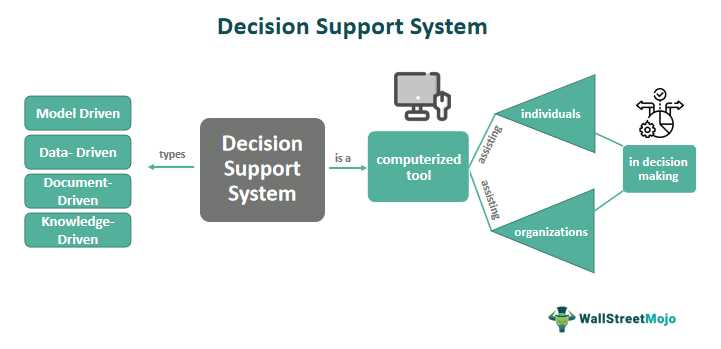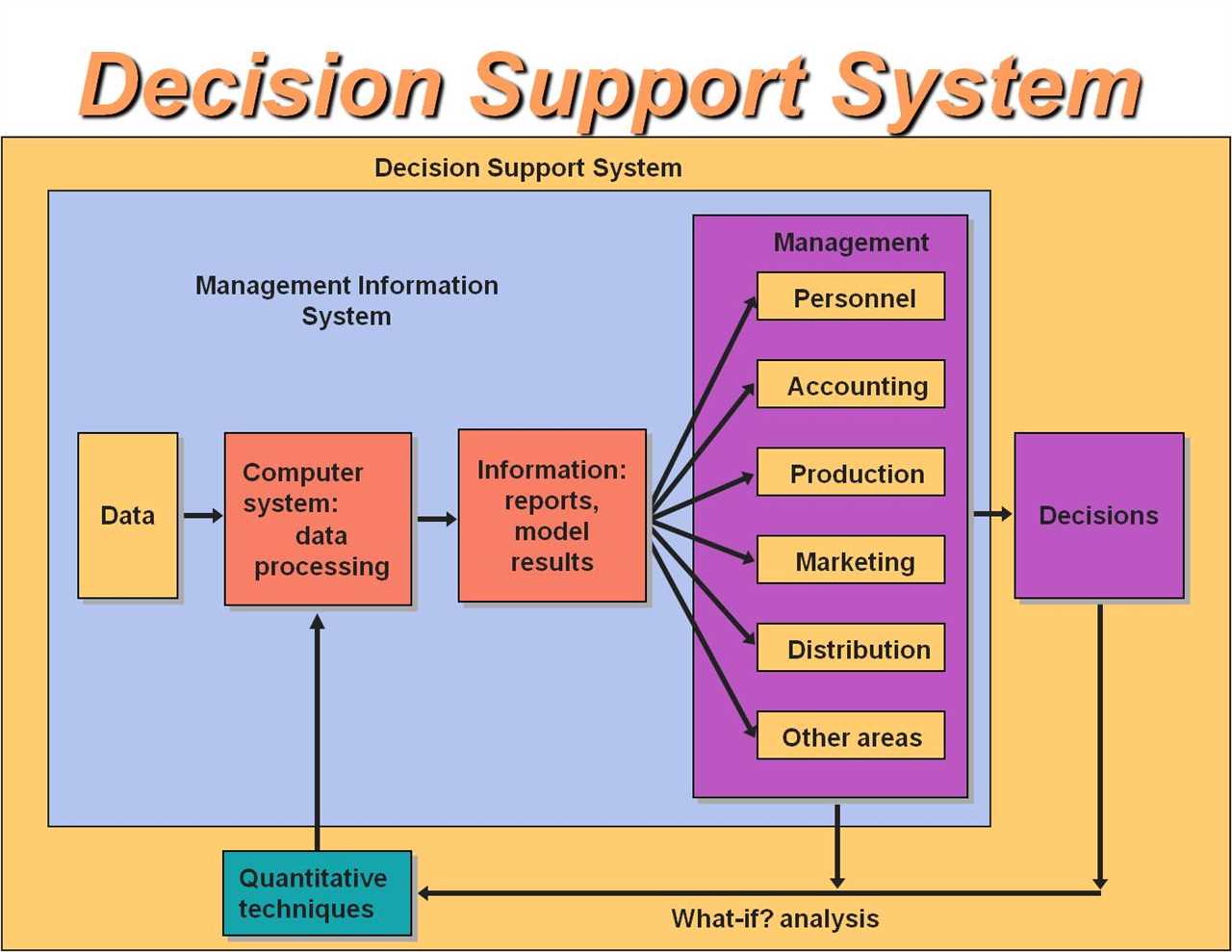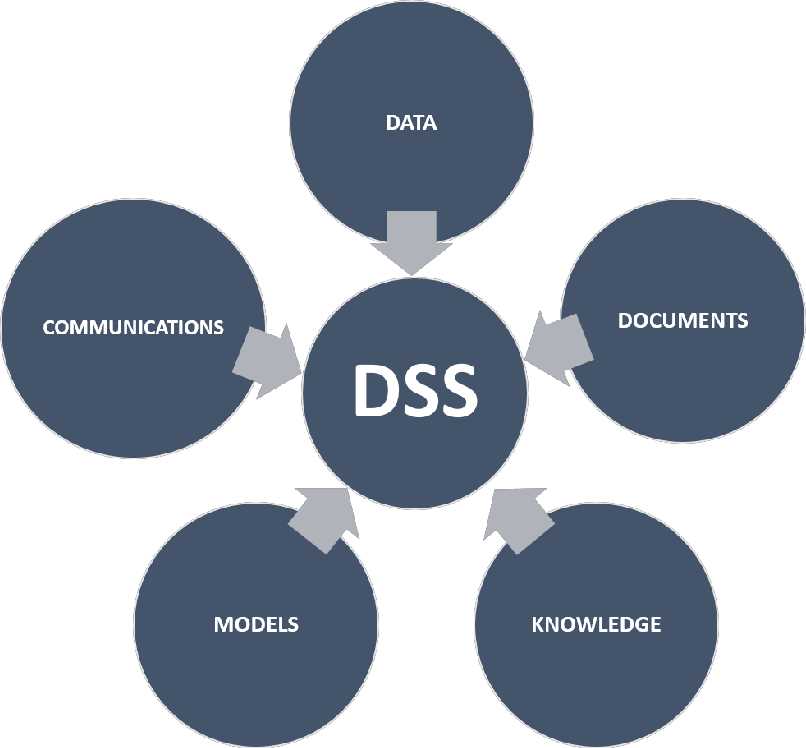What is a Decision Support System (DSS)?
A Decision Support System (DSS) is a computer-based tool that helps businesses and organizations make informed decisions. It is designed to assist decision-makers in analyzing complex data, evaluating different options, and predicting outcomes.
A DSS combines various technologies, such as data analysis, modeling, and simulation, to provide decision-makers with relevant information and insights. It integrates data from different sources, including internal databases, external sources, and real-time data, to support decision-making processes.
One of the key features of a DSS is its ability to handle large volumes of data and perform complex calculations quickly and accurately. It can process and analyze data from multiple dimensions, allowing decision-makers to explore different scenarios and assess the potential impact of their decisions.
A DSS typically includes a user-friendly interface that allows decision-makers to interact with the system and access the information they need. It provides various tools and functionalities, such as data visualization, reporting, and what-if analysis, to facilitate decision-making processes.
Overall, a Decision Support System is a valuable tool for businesses and organizations, as it helps them make better decisions, improve efficiency, and achieve their goals. By providing timely and accurate information, a DSS enables decision-makers to gain insights, identify trends, and make informed choices that can drive business success.
| Key Features of a Decision Support System: |
|---|
| Integration of data from multiple sources |
| Ability to handle large volumes of data |
| Complex data analysis and modeling capabilities |
| User-friendly interface for easy interaction |
| Data visualization and reporting tools |
| What-if analysis for scenario evaluation |
A Decision Support System (DSS) is a crucial tool for businesses in making informed decisions. It provides a framework that aids in analyzing complex data and information to support decision-making processes. By leveraging advanced technologies and algorithms, DSS assists businesses in evaluating various alternatives and predicting potential outcomes.
Importance of DSS in Business Decision Making
DSS plays a significant role in enhancing the decision-making process within organizations. It helps in:
- Improving Decision Quality: DSS enables businesses to access accurate and relevant data, facilitating better decision-making. It helps in identifying patterns, trends, and relationships in the data, allowing decision-makers to make informed choices.
- Enhancing Efficiency: DSS automates the process of data collection, analysis, and reporting, saving time and effort for decision-makers. It eliminates the need for manual data processing, reducing the chances of errors and improving overall efficiency.
- Enabling Scenario Analysis: DSS allows decision-makers to simulate different scenarios and evaluate their potential impact. By considering various what-if scenarios, businesses can assess the risks and rewards associated with different decisions, enabling them to make more informed choices.
Integration of DSS in Business Processes

To effectively integrate DSS into business decision-making processes, organizations need to consider the following:
- Data Collection and Management: DSS relies on accurate and reliable data. Organizations should establish robust data collection and management systems to ensure the availability of high-quality data for analysis.
- Collaboration and Communication: DSS should facilitate collaboration among decision-makers and stakeholders. It should provide a platform for sharing information, discussing alternatives, and obtaining feedback to make collective decisions.
- Flexibility and Scalability: DSS should be adaptable to changing business needs and scalable to handle large volumes of data. It should be able to accommodate new data sources and incorporate advanced analytics techniques to provide valuable insights.
- User-Friendly Interface: DSS should have an intuitive and user-friendly interface that allows decision-makers to interact with the system easily. It should provide visualizations, dashboards, and reports that are easy to understand and interpret.
Benefits of Implementing a Decision Support System
A Decision Support System (DSS) is a powerful tool that businesses can utilize to enhance their decision-making process. By implementing a DSS, companies can gain several benefits that can lead to improved efficiency and accuracy in decision making.
1. Improved Data Analysis
One of the primary benefits of implementing a DSS is the ability to analyze large amounts of data quickly and accurately. A DSS can gather data from various sources, such as internal databases, external sources, and real-time data feeds. It can then process and analyze this data to provide valuable insights and support decision-making processes.
With a DSS, businesses can identify patterns, trends, and correlations in the data that may not be immediately apparent. This allows decision-makers to make more informed and data-driven decisions, leading to better outcomes for the company.
2. Enhanced Decision-Making Process
A DSS provides decision-makers with the necessary tools and information to make well-informed decisions. It can present data in a visual and easily understandable format, such as charts, graphs, and dashboards, making it easier for decision-makers to interpret and analyze the information.
By having access to accurate and up-to-date data, decision-makers can evaluate different scenarios, perform “what-if” analyses, and assess the potential impact of their decisions. This enables them to make more confident decisions that are based on facts and evidence, rather than intuition or guesswork.
3. Increased Efficiency
Implementing a DSS can significantly improve the efficiency of the decision-making process. By automating data collection, analysis, and reporting tasks, a DSS eliminates the need for manual and time-consuming processes. This frees up valuable time for decision-makers to focus on strategic thinking and problem-solving.
A DSS can also streamline communication and collaboration among decision-makers and stakeholders. It allows for real-time sharing of information, feedback, and insights, facilitating faster and more effective decision-making.
4. Risk Reduction

A DSS can help businesses mitigate risks by providing accurate and timely information for decision-making. By analyzing historical data, market trends, and other relevant factors, a DSS can identify potential risks and uncertainties associated with different decisions.
With this information, decision-makers can assess the potential risks and develop strategies to minimize or mitigate them. This proactive approach to risk management can help businesses avoid costly mistakes and make more informed decisions that align with their goals and objectives.
Enhancing Efficiency and Accuracy in Decision Making

Implementing a Decision Support System (DSS) can greatly enhance the efficiency and accuracy of decision-making processes within a business. By utilizing advanced technologies and analytical tools, a DSS can provide valuable insights and information to decision-makers, enabling them to make more informed and effective decisions.
One of the key ways in which a DSS enhances efficiency is by automating and streamlining the decision-making process. Traditionally, decision-making involves gathering and analyzing large amounts of data, which can be time-consuming and prone to errors. However, with a DSS, data collection and analysis can be automated, saving valuable time and reducing the risk of human error.
Furthermore, a DSS can provide decision-makers with real-time access to relevant and up-to-date information. This allows them to make decisions based on the most current data, rather than relying on outdated or incomplete information. By having access to accurate and timely information, decision-makers can make more informed decisions that are aligned with the current state of the business.
In addition to enhancing efficiency, a DSS can also improve the accuracy of decision-making. By utilizing advanced analytical tools and algorithms, a DSS can analyze complex data sets and identify patterns, trends, and correlations that may not be apparent to human decision-makers. This can help to uncover hidden insights and potential risks, enabling decision-makers to make more accurate and data-driven decisions.
Moreover, a DSS can also facilitate collaboration and communication among decision-makers. By providing a centralized platform for data sharing and analysis, a DSS can enable decision-makers to collaborate and exchange ideas more effectively. This can lead to better decision-making outcomes, as multiple perspectives and expertise can be taken into account.
Key Components of a Decision Support System
A Decision Support System (DSS) is a powerful tool that helps businesses make informed decisions by providing them with accurate and timely information. It is made up of several key components that work together to support the decision-making process.
- Data Warehouse: The data warehouse is the central repository of all relevant data that is used by the DSS. It collects and stores data from various sources, such as internal databases, external sources, and real-time data feeds. The data warehouse ensures that the data is organized, integrated, and easily accessible for analysis.
- Data Mining: Data mining is the process of extracting useful patterns and insights from the data stored in the data warehouse. It involves using various statistical and analytical techniques to discover hidden relationships and trends. Data mining helps businesses identify patterns, make predictions, and uncover valuable insights that can inform decision-making.
- Reporting and Visualization: Reporting and visualization tools are used to present the findings and insights derived from the data analysis in a clear and understandable format. These tools help businesses communicate the results of their analysis to stakeholders, such as executives, managers, and employees. They provide visual representations, such as charts, graphs, and dashboards, that make it easier for users to interpret the data and make informed decisions.
- Collaboration and Communication: Collaboration and communication tools enable users to share information, collaborate on projects, and communicate with each other in real-time. These tools facilitate collaboration between different departments, teams, and individuals involved in the decision-making process. They allow for the exchange of ideas, feedback, and knowledge, which can lead to better decision-making and improved outcomes.
These key components work together to create a comprehensive Decision Support System that empowers businesses to make better decisions. By leveraging the power of data, analytics, and collaboration, DSS helps businesses gain a competitive edge and achieve their goals.
Data Collection and Analysis
A decision support system (DSS) is a powerful tool that businesses can use to collect and analyze data in order to make informed decisions. The data collection and analysis component of a DSS is crucial in providing accurate and relevant information for decision-making processes.
Once the data is collected, the DSS uses various analysis techniques to process and interpret the information. These techniques can include statistical analysis, data mining, and predictive modeling. By analyzing the data, businesses can identify patterns, trends, and correlations that can help them make more accurate predictions and informed decisions.
The analysis component of a DSS also allows businesses to perform “what-if” scenarios and simulations. This means that they can test different scenarios and assess the potential outcomes before making a final decision. By simulating different scenarios, businesses can minimize risks and optimize their decision-making process.
Furthermore, a DSS can provide businesses with visualizations and reports that present the analyzed data in a clear and understandable format. These visualizations can include charts, graphs, and dashboards that allow decision-makers to quickly grasp the key insights and make informed decisions.

Emily Bibb simplifies finance through bestselling books and articles, bridging complex concepts for everyday understanding. Engaging audiences via social media, she shares insights for financial success. Active in seminars and philanthropy, Bibb aims to create a more financially informed society, driven by her passion for empowering others.
